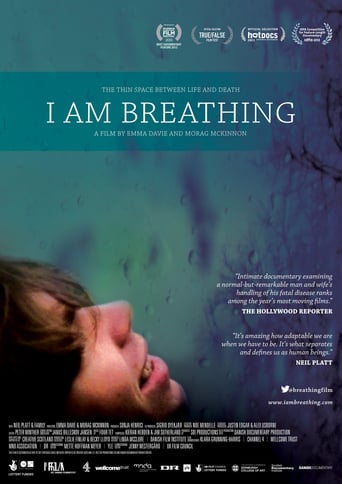

hyped garbage
... View MoreWhen a movie has you begging for it to end not even half way through it's pure crap. We've all seen this movie and this characters millions of times, nothing new in it. Don't waste your time.
... View MoreWhile it doesn't offer any answers, it both thrills and makes you think.
... View MoreIn truth, any opportunity to see the film on the big screen is welcome.
... View MoreI am Breathing is really harrowing documentary that shows the end of Neil Platts life. I wish I could say that it was brilliantly made and was a wonderful watch, because the subject matter is definitely worth it, but the documentary itself gave me motion sickness. While there is definitely love and passion behind this project, the use of shaky home video footage made it slightly unpleasant to watch at times.It was well paced and their choice of showing clips in a non-linear timeline really worked.The end of the documentary was emotional but I would of liked to have seen some more interviews with people he was close too discussing what life was like with and without him.While the subject matter of this documentary is important and it is a much watch for people who don't know a lot about the disease, I feel like it could of been a lot better but it does the job of getting the point across.
... View MoreI AM BREATHING is the end tale of Neil Platt, a totally ordinary man who inherits his father's terminal illness 20 years before its due date, mere months after the birth of his own son Oscar. Neil tells it himself, literally and as screenwriter, because he resolved to document his journey by means of a blog from the first day of diagnosis to the end; the goal – 100 entries before the main event rendered him mute and completely incommunicado.The filmmakers were present with Neil for a period of time after the disease paralyzed him from the neck down (he had Motor Neurone Disease, also known as Amyotrophic Lateral Sclerosis (ALS) or Lou Gehrig's disease) to the day after he leaves for hospice. Between Neil's confessionals, we hear excerpts from Neil's blog narrated by an actor, receive tiny interview snippets from mom and wife Louise. Their contributions are moving of course, but the content thereof is about what one would expect. The filmmakers choose a more subtle manner to convey the complexities of their role, show rather than tell. Oscar's toddler antics provide the foil for normalcy against the adult reality playing out.The pacing is contemplative, as one would expect. But it's not "that" kind of "contemplative," the kind where nothing happens, the kind where the filmmakers are in love with a shot that does nothing for the story. No, the filmmakers unobtrusively underscore Neil's ordinariness-made- extraordinary-by-means-of-circumstance-and-our-witness-to-it, by interspersing his testimonials with clips of Neil in younger days, with artful shots of everyday beautiful things that Neil is seeing with new eyes, with scenes of the child's view of the world, with scenes of friends and family doing not much more than being with him in a loving or companionable way, which speaks volumes (ever avoided a sick or dying friend just because you didn't know what to say?). Their treatment allows the viewer to alternate between asking themselves the rather daunting question "what would I do if I had only months to live" and watching this one man's inspiring answer.It's hard, very hard, to make a film about an individual and find the universal in it. It's very hard to capture the uber-message in a particular circumstance that raises it to a level where people's empathy and minds are engaged in the bigger question and at the same time honouring the subject of the film. McKinnon and Davie's ability to find this balance has got to be part of the reason it has garnered the documentary accolades from audiences and raves from reviewers. My jaded self says it would be easy to dismiss the raves as simply knee jerk reactions to a film that deals with a guy dying – how does someone trash an effort like that? But in this case, having been in a remarkably parallel universe, I agree with the accolades. The filmmakers have achieved the universal in the personal, a state of documentary film grace to which we as artists aspire, and audiences would do well to witness.
... View MoreThis documentary chronicles the slow death of a young man. He is diagnosed with a fatal illness as he becomes a father, and he knows he will die when his son is only about three: too young to remember him. It's a devastating film, and its purpose is partly to record the father's life so his son can know him. Documented in the film is the box of belongings father is leaving to son. The film itself is a kind of memory box, a statement, "I once lived."It could be depressing or intrusive, but the film is handled with such tact and sensitivity, and the subject, Neil Platt, wanted it made. He's an active participant in the documenting of his slide towards death. His passion for life informs every frame.
... View More